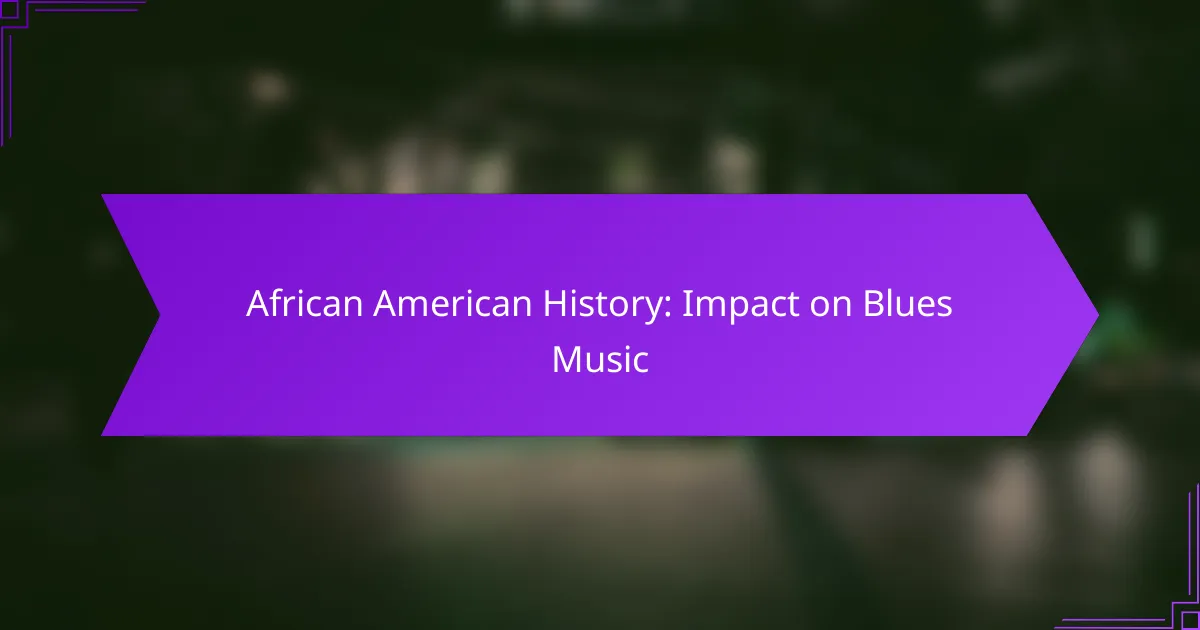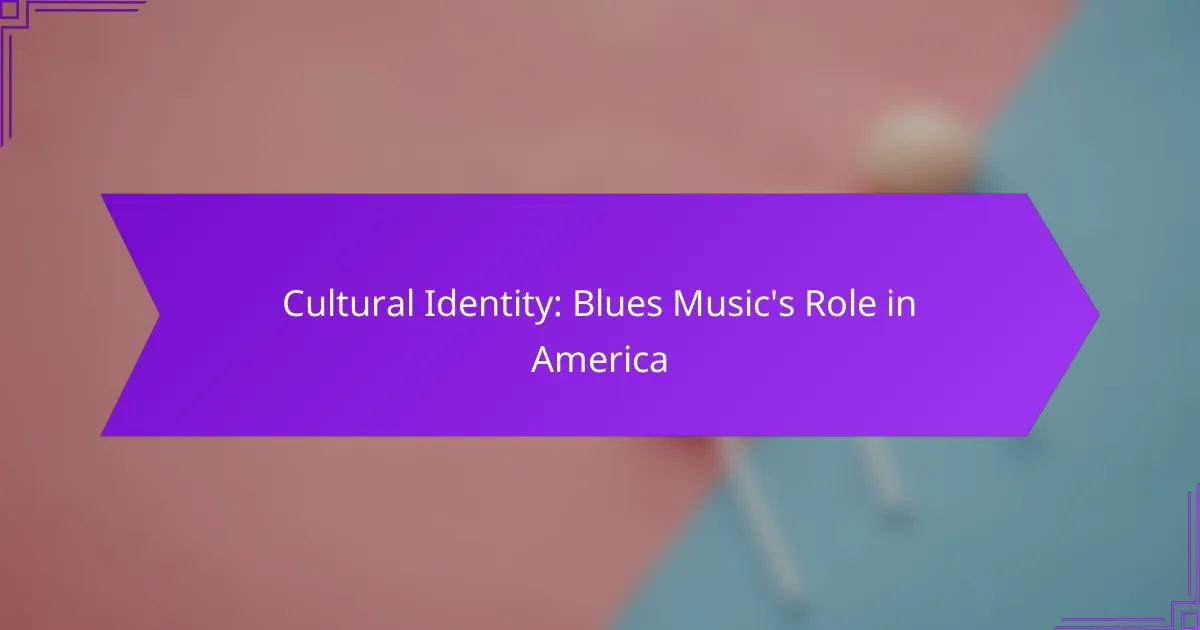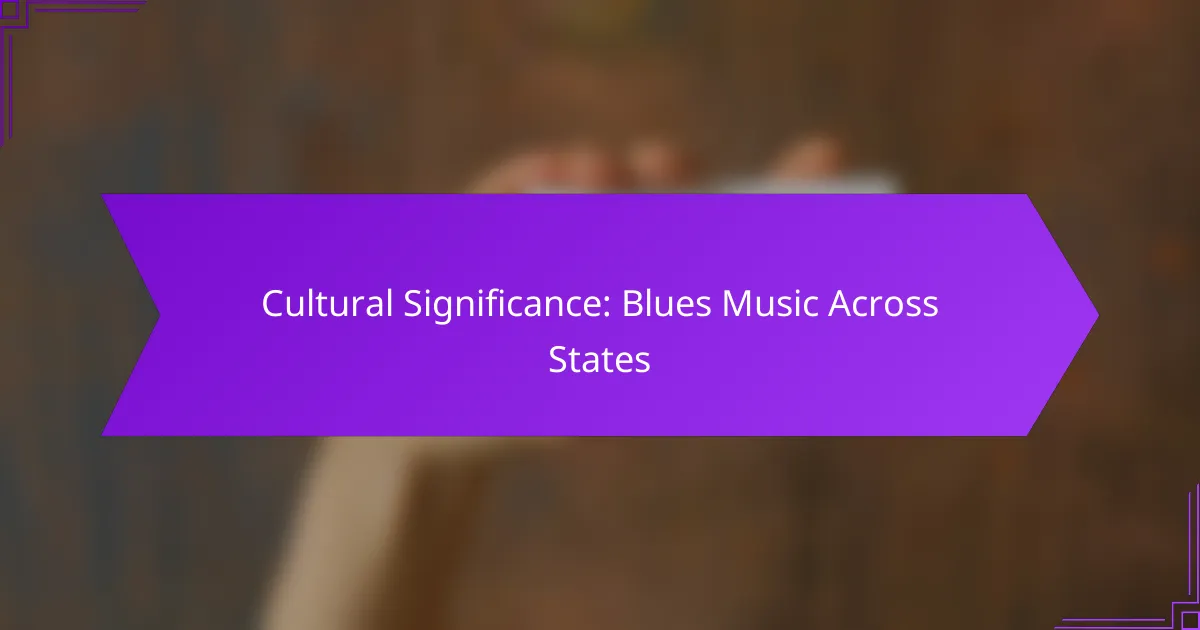Blues music continues to shape contemporary music by influencing artists across various genres with its emotional depth and storytelling. Festivals celebrating this rich heritage attract diverse audiences, showcasing both established and emerging talents. Additionally, educational programs are dedicated to preserving the blues tradition while fostering innovation among new musicians.
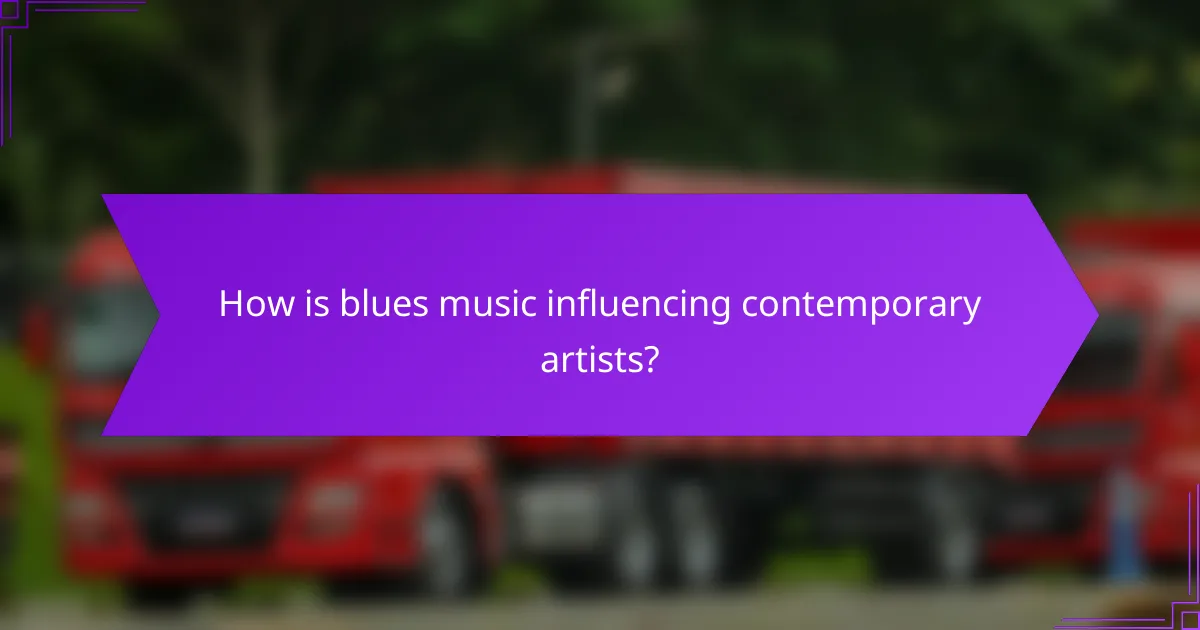
How is blues music influencing contemporary artists?
Blues music significantly influences contemporary artists by shaping their sound and lyrical themes. Many musicians draw inspiration from the emotional depth and storytelling tradition of blues, integrating its elements into various modern genres.
Integration in modern genres
Contemporary genres like rock, hip-hop, and pop often incorporate blues elements, creating a fusion that resonates with diverse audiences. Artists may use blues scales, chord progressions, and rhythmic patterns, enriching their music with a soulful touch.
For example, artists such as Gary Clark Jr. and The Black Keys blend blues with rock, while hip-hop artists like J. Cole and Kendrick Lamar reference blues themes in their lyrics, showcasing the genre’s versatility and relevance.
Collaborations with pop and rock musicians
Collaborations between blues artists and musicians from pop and rock genres are increasingly common, leading to innovative musical creations. These partnerships allow for the exchange of ideas and styles, resulting in fresh sounds that appeal to a broader audience.
Notable collaborations include those between blues legend Buddy Guy and pop stars like John Mayer, which highlight how blues can enhance mainstream music while introducing new listeners to its roots.
Impact on songwriting and lyrics
The storytelling aspect of blues music profoundly influences contemporary songwriting. Many artists adopt the blues’ narrative style, focusing on personal experiences, struggles, and emotions, which resonates deeply with listeners.
Songwriters often employ blues-inspired themes of love, loss, and resilience, creating relatable content. This approach can be seen in the works of artists like Adele and Hozier, who weave bluesy elements into their lyrics, enhancing their emotional impact.
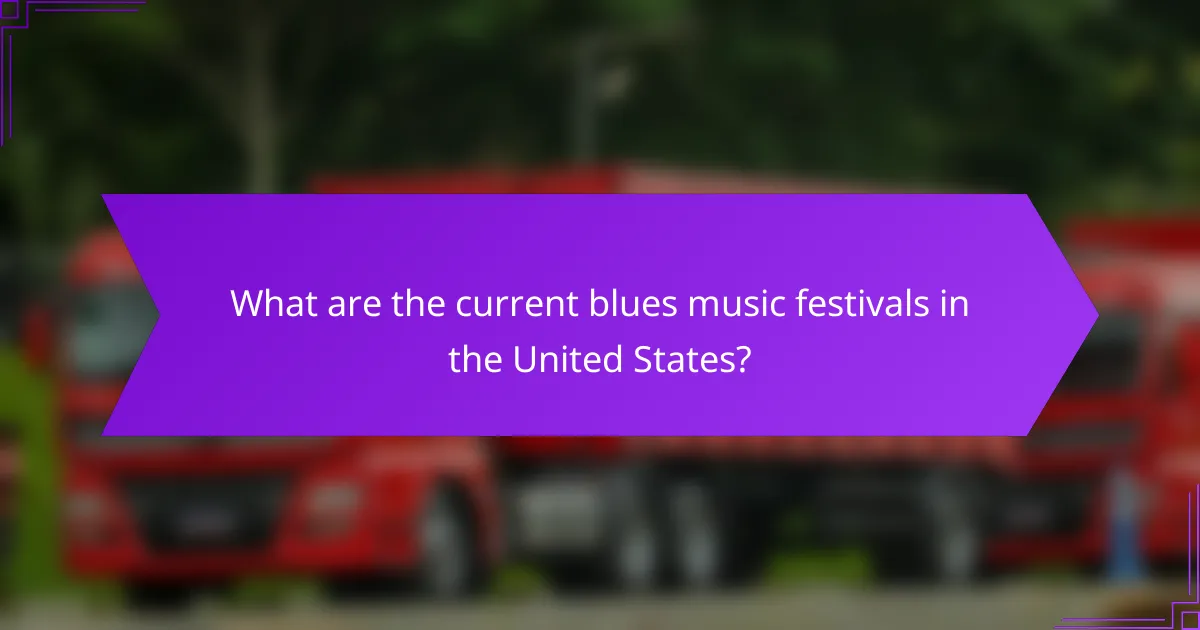
What are the current blues music festivals in the United States?
Several prominent blues music festivals take place across the United States, celebrating the genre’s rich heritage and contemporary influence. These festivals feature a mix of established and emerging artists, drawing fans from various regions and offering a vibrant atmosphere for music lovers.
Chicago Blues Festival
The Chicago Blues Festival is one of the largest and most recognized blues festivals in the country, typically held in June. This free event showcases a diverse lineup of blues musicians, from legendary performers to local talent, and takes place in Grant Park, creating a lively community atmosphere.
Attendees can enjoy multiple stages featuring performances, workshops, and panel discussions about the history and evolution of blues music. It’s a great opportunity for fans to immerse themselves in the genre and connect with fellow enthusiasts.
New Orleans Jazz & Heritage Festival
The New Orleans Jazz & Heritage Festival, often referred to as Jazz Fest, celebrates not only jazz but also blues, gospel, and other genres. Held annually in late April to early May, this festival attracts thousands of visitors to the Fair Grounds Race Course.
Jazz Fest features a wide array of performances from both local and national artists, along with food vendors offering traditional New Orleans cuisine. The festival emphasizes cultural heritage, making it a unique experience for attendees to enjoy music and local culture simultaneously.
King Biscuit Blues Festival
Taking place in Helena, Arkansas, the King Biscuit Blues Festival is a tribute to the legacy of blues music and its roots in the Mississippi Delta. This festival usually occurs in October and is known for its intimate setting and strong community involvement.
The event features a mix of performances, workshops, and local arts and crafts, creating a family-friendly atmosphere. Attendees can expect to see both emerging and established blues artists, making it a must-visit for blues aficionados.

How is blues music being taught today?
Blues music is taught today through various educational avenues, including university programs and online courses. These platforms aim to preserve the genre’s rich history while equipping new generations with the skills to perform and innovate within the style.
University programs in blues studies
Many universities now offer dedicated programs in blues studies, often as part of broader music or cultural studies degrees. These programs typically cover the historical context of blues, its musical structure, and its influence on other genres.
Students engage in both theoretical and practical components, learning to play instruments commonly associated with blues, such as the guitar and harmonica. Some institutions even provide opportunities for live performances, allowing students to showcase their skills in real-world settings.
Online courses and workshops
Online platforms have emerged as popular alternatives for learning blues music, offering flexibility and accessibility. Courses range from beginner to advanced levels, often featuring video lessons, sheet music, and interactive assignments.
Workshops led by experienced musicians provide hands-on learning experiences, allowing participants to refine their techniques and receive feedback. Many of these online offerings are available at varying price points, making them accessible to a wide audience.
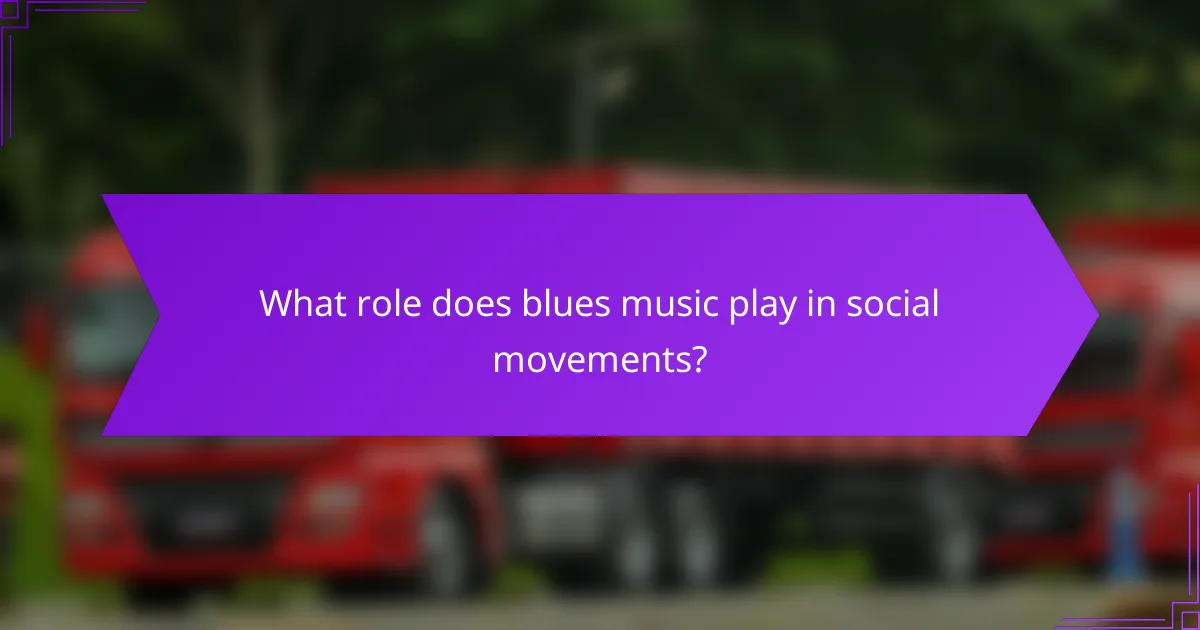
What role does blues music play in social movements?
Blues music plays a significant role in social movements by serving as a powerful medium for expressing struggles, hopes, and calls for change. Its roots in African American history make it a vital tool for advocacy and community cohesion, resonating with various social justice causes today.
Advocacy for civil rights
Blues music has historically been intertwined with the civil rights movement, providing a voice for those fighting against racial injustice. Artists like B.B. King and Muddy Waters used their music to highlight the struggles faced by African Americans, influencing public opinion and inspiring activism.
Today, contemporary blues musicians continue this legacy by addressing current social issues through their lyrics. Songs often tackle themes of inequality, police brutality, and systemic racism, encouraging listeners to engage in advocacy and support civil rights initiatives.
Community building through music
Blues music fosters community by bringing people together through shared experiences and cultural heritage. Local blues festivals and jam sessions create spaces for collaboration and connection, allowing individuals to bond over their love for the genre.
Moreover, community organizations often utilize blues music as a tool for outreach and education, promoting unity and resilience. By participating in these musical gatherings, individuals can strengthen their ties to one another while celebrating their cultural identity and history.
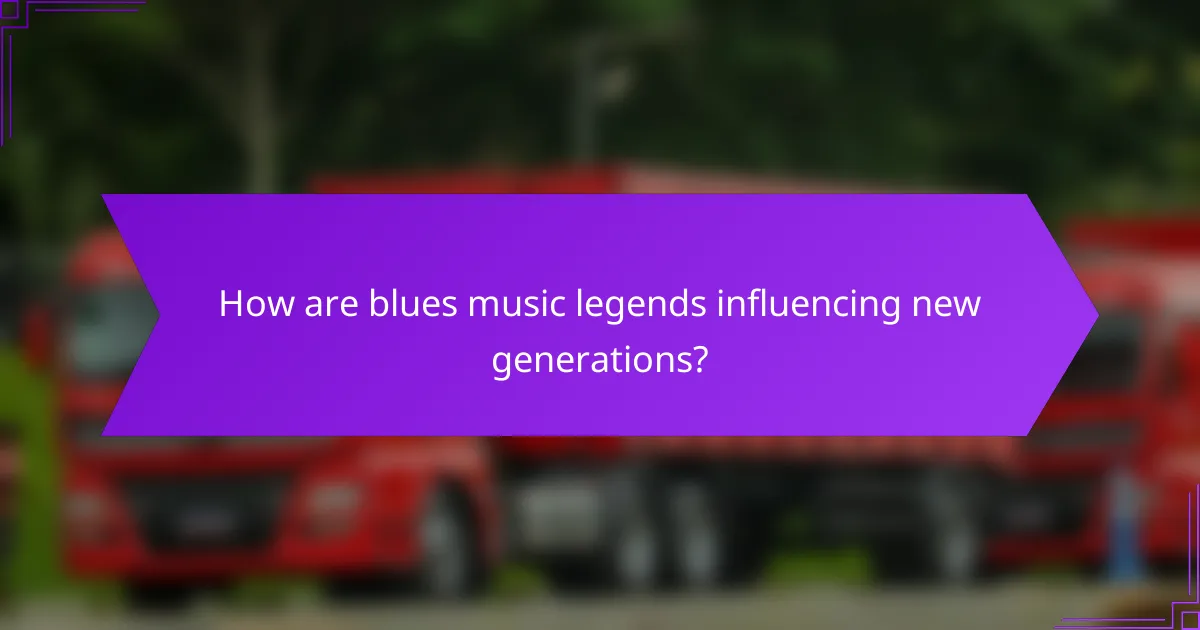
How are blues music legends influencing new generations?
Blues music legends are significantly shaping new generations by serving as both inspirations and mentors. Their influence is evident through various initiatives that promote the genre and its cultural significance.
Mentorship programs
Mentorship programs play a crucial role in connecting established blues musicians with emerging artists. These programs often include workshops, jam sessions, and one-on-one guidance, allowing newcomers to learn directly from seasoned professionals.
For example, organizations like the Blues Foundation offer mentorship opportunities that help young musicians develop their skills and navigate the music industry. Participants can gain insights into songwriting, performance techniques, and the business aspects of music.
Legacy of iconic artists like B.B. King
The legacy of iconic artists such as B.B. King continues to resonate with contemporary musicians. His unique style and emotional storytelling have inspired countless artists across various genres, encouraging them to explore their own musical identities.
Many modern blues musicians pay homage to King’s contributions by incorporating his techniques into their performances. This not only preserves the essence of blues music but also introduces it to new audiences, ensuring its relevance in today’s music scene.
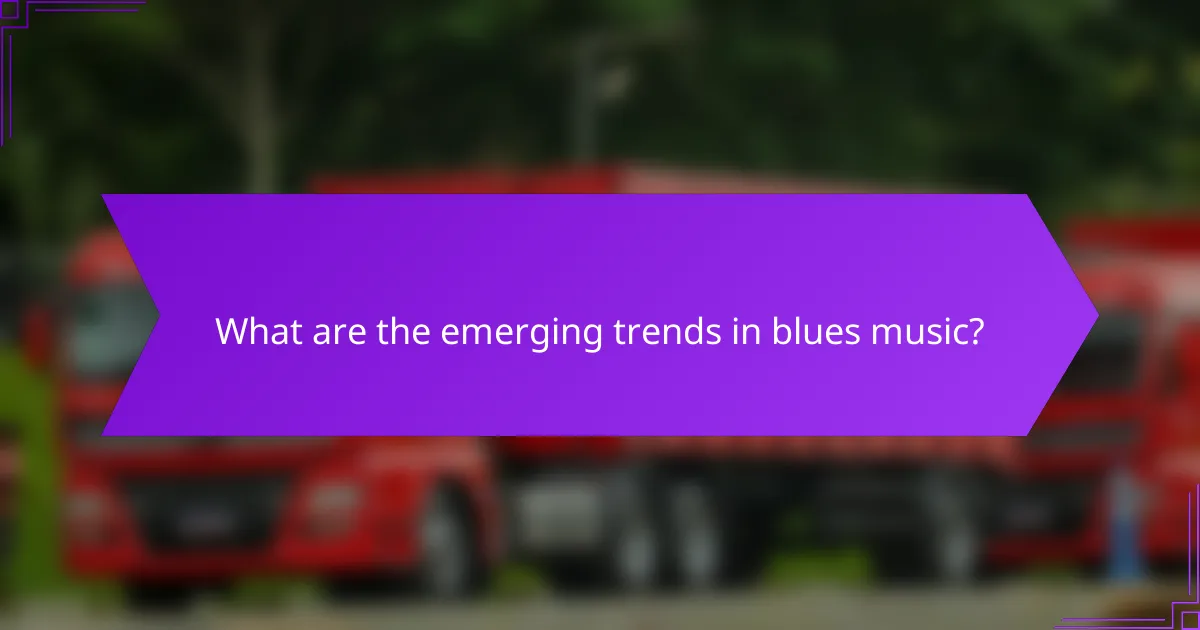
What are the emerging trends in blues music?
Emerging trends in blues music reflect a dynamic evolution, blending traditional elements with modern influences. Artists are increasingly experimenting with various genres, leading to innovative sounds that resonate with contemporary audiences.
Fusion with electronic music
The fusion of blues with electronic music is gaining traction, creating a unique sound that appeals to younger listeners. This trend often involves the use of synthesizers, drum machines, and digital effects, which can enhance the emotional depth of traditional blues themes.
For example, artists like Gary Clark Jr. and Joe Bonamassa have incorporated electronic elements into their music, resulting in tracks that maintain the essence of blues while exploring new sonic landscapes. This fusion allows for a fresh take on classic blues, making it more accessible to a wider audience.
Revival of traditional blues styles
Alongside modern innovations, there is a notable revival of traditional blues styles, particularly among younger musicians. This resurgence often emphasizes acoustic instruments and authentic storytelling, reflecting the roots of the genre.
Artists are revisiting classic techniques, such as slide guitar and call-and-response vocals, to create a sound that honors the past while still feeling relevant. Festivals and local venues are increasingly showcasing these traditional styles, helping to educate audiences and foster appreciation for the genre’s heritage.
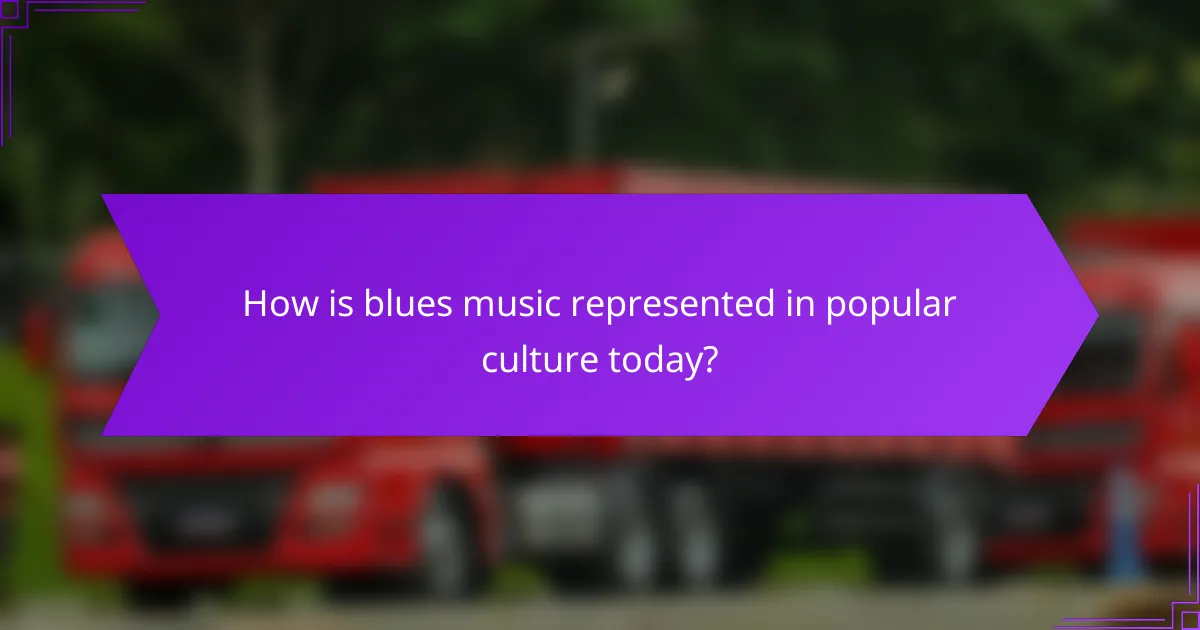
How is blues music represented in popular culture today?
Blues music is prominently featured in various aspects of popular culture, influencing genres like rock, jazz, and hip-hop. Its themes of struggle and resilience resonate through modern music, film, and art, showcasing its enduring legacy.
Film soundtracks featuring blues
Blues music plays a significant role in film soundtracks, enhancing emotional depth and storytelling. Many films incorporate blues tracks to evoke feelings of nostalgia, sorrow, or triumph, making the music an integral part of the cinematic experience.
Notable films such as “The Blues Brothers” and “O Brother, Where Art Thou?” prominently feature blues music, showcasing its cultural significance. These soundtracks often include classic blues artists, introducing new audiences to the genre while enriching the films’ narratives.
When selecting blues music for a film, consider the mood and themes of the story. Tracks that reflect the characters’ journeys or emotional states can create a powerful connection with the audience, making the blues an effective tool for filmmakers.

